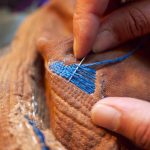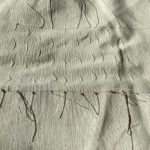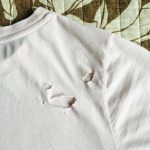The “Portraits” series is a showcase of new writing by New Arts Journalism (NAJ) students at the School of the Art Institute of Chicago.
We live in a constantly evolving, high-consumerist society. We’re absorbed by our iPhones and iPads, throwing things out before we even get a chance to appreciate their value. But studies have shown that consumerism and the constant pursuit of material things takes a toll on mental health, providing us with a false sense of happiness.
Lindsay Coulter earned her MA in Art Therapy two years ago from the School of the Art Institute of Chicago (SAIC) and holds a bachelor’s degree in Psychology from the University of Wisconsin-Madison. In her current work, Coulter explores the therapeutic role of textiles — particularly in fashion — in mending and self care.
Coulter has always been interested in fashion and how people use fashion to identify themselves. In an interview with F Newsmagazine, she described fashion and its culture as “a space where we express our dynamic identity; a language where you can call out to others in terms of how you dress.”
“It’s fascinating to see more women now wearing whatever they want,” Coulter said. “[Fashion] is the site of exploring freedom.”
For Coulter, the ultimate goal for an art therapist is to help a person express and acknowledge their freedom of identity. This goal led to her experimentation with fashion therapy.
She argues that in claiming an independence from the consumerist culture in which we live, we must be able to clothe ourselves rather than being reliant on a system which demands that we constantly buy more. She believes it’s important to seek out our own individuality instead of conforming to what the industry brainwashes us to buy.
“There is a large force that tells us to care about what’s ‘in,’ instead of creating a personal style that represents us,” Coulter said. “It tells us to buy, buy, buy, and fuck up the Earth because of what the textile industry is doing.”
She first realized the importance of self-identity, fashion, sustainability, and clothing when she learned about Mahatma Gandhi’s Khadi movement. During the 1920s, Gandhi urged the people of India to boycott British clothes and weave their own fabric. This popular movement was largely responsible for igniting the force that drove India to seek its independence. To Coulter, the Khadi movement exemplifies the power of stepping away from the demands of the consumerist bubble.
Coulter currently divides her time between working as a therapist at the Portrait Health Center, and hosting Indigo dyeing workshops at the Japanese Cultural Center. She acknowledges that her time at the Japanese Cultural Center has greatly influenced her when it comes to seeing sustainability and the inherent value in her clothing.
She was inspired by the Japanese philosophy of Wabi-sabi, which, as Coulter put it, is “the acknowledgement that beauty comes from the imperfect, impermanent, and incomplete.” Coulter learned the “boro” technique, which involves the mending, patching, and indigo dyeing of Japanese textiles.
Coulter is particularly repulsed by how many people consume and view clothing as if though it is expendable — though our clothes are literarily grown from the earth. She acknowledged the efforts of the people who have taken their time to stitch clothing with patience; sometimes one article moves from one side of the planet to the other in its manufacture. Yet, most consumers chose to ignore or dismiss the hard work of these laborers.
On November 30, at 4:15 p.m. in the Sharp Building, Coulter will host Kintsukuori Cloth: Visible Mending as a Method of Compassion in conjunction with the SAIC Wellness Center. The event will be led by April Knighton (MAAT ’12) with support from her studio, Yumuko Workshop.
In scheduling her workshop during Crit Week, Coulter said she hopes her practice of garment mending as self care will serve as stress relief for the workshop’s participants.
The workshop will focus on the art of sustaining clothes that have been torn or ripped. She will be teaching two techniques of mending: darning and patching. The aim of this workshop will be to embellish the flaw of the fabric rather than hiding it with identical materials. She encourages participants to bring a fabric or thread of a different color than the item they wish to mend, in order to highlight the history of the repair.
Coulter suggests that the purpose of this exercise is appreciation.
“What it is it about this garment that you want to keep that means so much to you in the first place?” she said. “[It’s about] increasing your cultivation and connection to things that bring you that joy … so that you are surrounded by things that you love.”
Coulter urges students to be appreciative of the labor of the making process by mending flaws — not throwing them away.
Lindsay Coulter’s workshop, Kintsukori Cloth: Visible Mending, will be held on November 30, from 4:15-6:00 p.m. on the ground floor of the Sharp Building.











